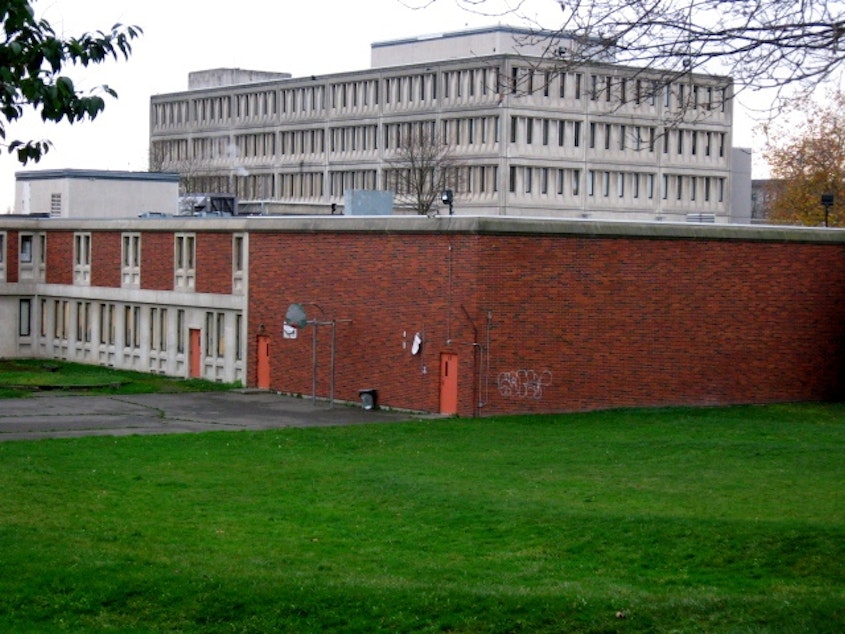Should kids in jail talk with their lawyers before cops?

At any given time about 50 young people are booked into the juvenile detention facility on East Alder Street in Seattle. Some are awaiting trial, others are booked because there’s no adult to release them to. More than half are kids of color.
Right now, a young person detained in King County can decide for themselves whether to talk to law enforcement without an attorney. But both the Office of Public Defense and King County Councilman Dave Upthegrove say kids need more protection.
Attorney Anita Khandelwal, policy director at the Office of Public Defense, said the problem is clear if you consider a recent scenario involving a 17-year-old African American male being held in Seattle.
“A guard came to him and said someone was out in the visiting area to see him,” Khandelwal said. “He didn't know who it was, and he walked out and he saw that it was law enforcement."
The boy agreed to talk with them, but Khandelwal said things quickly went south. Eventually a public defender took noticed and stepped in.
Sponsored
“And she interrupted the interrogation and said ‘Do you want this to continue?’ And he didn't, and so she ended it for him,” Khandelwal said. “He really described a deep sense of relief when when this ended for him.”
Khandelwal said the boy told her he felt harassed, scared and intimidated. It’s a situation she says that could be avoided. King County Councilman Dave Upthegrove is proposing that young people be required to consult with an attorney before they make the decision to talk.
And there’s an increasing body of evidence that shows kids in detention aren’t capable of making that choice on their own. Laurence Steinberg, Temple University professor of psychology, says teenagers aren’t as good at understanding the long-term consequences of their decisions, especially in stressful situations.
“What studies have shown is that they tend to focus on the short-term consequences and they're not aware that they may be saying things that can be used against them later on,” Steinberg said.
This can be exacerbated for people of color. “People of color may be even more frightened or more stressed out by the experience because of what they know from watching the news or from other people's experiences.”
Sponsored
King County Prosecutor Dan Satterberg and the Sheriff's Department think it’s a bad idea for the county to effectively invoke constitutional rights on behalf of kids in detention.
“It's well-intentioned and we all want our kids to be safe. We want to protect vulnerable kids, but it would have unintended consequences,” Satterberg said.
Detention is one of the places where law enforcement can try to begin a conversation with victims of sex trafficking away from their pimps.
“It's very hard to deal with, to talk to young girls out on the street when their pimps are nearby. But if they're in detention, detectives regularly will go up and we have to build a relationship with them. Sometimes it takes a couple of visits before the young woman will realize that this police officer really wants to help me,” Satterberg said.
Satterberg fears under Upthegrove’s motion, this opportunity would be lost because attorneys would always advise the juvenile not to say anything without an attorney.
Sponsored
“And we all know that if the public defenders get involved, that they're going to tell their clients not to talk or they're going to want some sort of deal or something, so they're going to interfere with that relationship that needs to be established in order to help rescue the young girl from prostitution. And this isn't a hypothetical; this happens regularly at a juvenile hall,” Satterberg said.
Khandelwal said that would be violation of professional conduct. Attorneys advocate for their clients based on individual circumstances.
“I think a kid who has been told by an attorney that it's safe to have this conversation — that you're not going to go deeper into the system if you have this conversation — they're going to be more willing to talk to law enforcement. That child is going to be less scared and possibly be more forthcoming and share more accurate information.”
Though they disagree with the council's motion as it’s written, both the King County Sheriff and the prosecutor's office say they’re interested in examining best practices around questioning kids in detention.
Chris Barringer at the King County Sheriff's Department agreed that there could be a “comprehension gap” when it comes to Miranda rights and young people. Barringer said they would partner with Public Defense to write a Miranda card that’s more kid friendly.
Sponsored
“It doesn’t seem to make sense that we’re advising 14 year olds of their rights in the exact same language that we’re advising 50 year olds,” Barringer said.
The King County Council’s Law and Justice Committee will hear the motion Tuesday afternoon.

